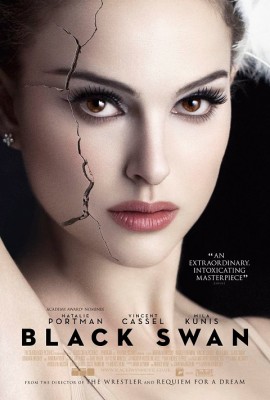After all the hype, Black Swan turns out to be… not bad.
In a film filled with great performances and terrific cinematography [by Matthew Libatique] – and superb direction – the suspense is murderous… until the very last scene. It’s that last scene, though, that caused a spontaneous reaction of ‘Really?’ when I saw it on the weekend.
The story – as is rather obviously stated by Thomas Leroy [Vincent Cassell], creative genius [ballet department] – is that of the swan in the ballet, Swan Lake. A girl is turned into a white swan and can only become human again through love. The man she falls for is seduced by a beautiful black swan and so, the white swan kills herself. In doing so, she is finally free.
Nina Sayers [Natalie Portman] is just a dancer in the background until she wins the lead in Leroy’s stripped-down re-imagining of Swan Lake – a role she gets even though he has doubts that she’ll be able to pull off the Black Swan role. As she works on the role, the troupe gets a new dancer, Lily [Mila Kunis] – who is uninhibited and Nina is controlled.
Then there’s the faded wannabe who is Nina’s mother, Erica – from whose lips, ‘My sweet girl’ takes on almost terrifying overtones. Her pride in her daughter’s big break is tempered with, well, temper. She explodes when Nina suggests her career never happened. ‘I quit to have you!’ Erica hisses. Clearly, she thinks she coulda been a contender [or something].
As you might expect, Nina is as intrigued by Lilly as she is fearful of Lilly. Which leads to unexpected events – at least for Nina. But wait! All is not as it seems…
With Black Swan, Darren Aronofsky has made the ballet film he’s been thinking of for years. That it could function as a companion piece to The Wrestler – with its depiction of the brutal regimen its dancers go through to perform echoing that of Mickey Rourke’s faded former wrestling great – is pretty cool, but it’s the psychosexual thriller aspect of the film that has caused all the buzz. Ballet is a sensuous art and here, the sensuousness is deadly.
Throughout the film, once Nina has gotten her dream role, there are indications that something is amiss. There are events that either don’t quite add up, or add up to too much. Once she gets past the initial burst of joy that comes with getting the role, Nina becomes darker, worried. Can she live up to Leroy’s expectations? Is Lily attempting to undermine her? Just what the heck is going on?
Between the foreshadowing of Leroy’s succinct summation of Swan Lake and fading star Beth McIntyre’s [a very effective Winona Ryder] angry denunciation of Leroy and spite toward Nina, the film has more than built a significant level of dread even before Nina begins to… what, exactly? Lose faith in herself? Imagine conspiracies?
Aronofsky directs from a script by Mark Heyman, Andres Heinz and John J. McLaughlin – and he sets up the oddly claustrophobic, brittle world of Nina Sayers with a mix of bold strokes and subtle nuance. The film works brilliantly… until that last scene – when we realize that Leroy’s description of Swan Lake cuts pretty close to the bone.
Although everyone in the cast brings their A-game to the film, without the electrifying chemistry between Portman and Cassell, and Portman and Kunis, Black Swan could have been a bad Dario Argento riff. Instead, except for that last scene, it’s a pretty dazzling display by all concerned.
Portman is in literally every scene and is compelling throughout. Kunis gives what could be [finally] a star-making role as Lily. If they don’t get Oscar® nominations, there’s no justice. But still, there’s that last scene – the one that had me shaking my head and thinking ‘Really?’ After all this brilliance, it comes down to this? That’s it? It was just so… expected!
Maybe the ending will work for you, but for me, it dropped an A+ film to something less.
Final Grade: B
